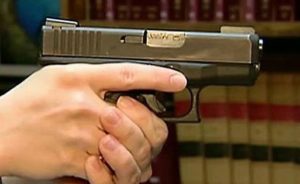Possession of a Weapon for an Unlawful Purpose Defense Attorneys
Bergen County NJ Criminal Defense Lawyers

Possession of a weapon for an unlawful purpose is a serious felony charge in NJ. While the most commonly charged gun crime in New Jersey is for unlawful possession of a weapon, one crime that also gets charged quite frequently is possession for an unlawful purpose. This charge is different from a straight unlawful possession because it can apply even if you were licensed to carry the firearm. It’s not carrying the weapon that will get you into trouble with the law; it’s the reason that you are carrying the weapon that could get you arrested and charged with a felony gun crime. Unlawful possession of a weapon frequently occrs when the question is a firearm for which the individual does not have a valid license or carry permit, but both illegal possession and possession of a weapon for an unlawful purpose can apply even when the weapon was not a gun. The weapons laws in New Jersey place limitations on handguns, as well as other dangerous or potentially deadly weapons such as knives, baseball bats, blackjacks, slingshots, sandclubs, and brass knuckles.
Facing a possession of a weapon for an unlawful purpose charge in Bergen County NJ? You’ve come to the right place. Travis J. Tormey and the attorneys at The Tormey Law Firm have extensive experience representing clients charged with illegal gun offenses, including unlawful possession of a weapon, certain persons offenses, and unlawful disposition of a firearm in Bergen County and throughout New Jersey. Representing clients in towns such as Franklin Lakes, Oakland, and Ridgewood on a regular basis has allowed them to hone their crafts in the realm of criminal and DWI defense. In fact, Mr. Tormey was named one of the Top 10 Criminal Defense Attorneys Under 40 In New Jersey in 2014 by the National Academy of Criminal Defense Attorneys and also heralded as one of the Top 40 Attorneys Under 40 in the Nation in 2014 by the National Trial Lawyers Association.
For a free consultation about your weapons charges in New Jersey, call (201)-330-4979, submit an online contact form, or schedule an appointment to meet with us in person at our convenient Hackensack office location. You can also review our client testimonials page for additional information and check out our client reviews on Avvo.com.
Possession of a Weapon for an Unlawful Purpose: N.J.S.A. 2C:39-4
In New Jersey, N.J.S.A. 2C:39-4 governs charges for possession of a weapon for an unlawful purpose. The criminal statute lists the specific weapons that qualify for possession of a weapon for an unlawful purpose: firearms, explosives, destructive devices, and imitation firearms. The statute also includes a catch-all provision for “other weapons,” which basically applies to any object or item that can be used to harm another person or to damage property. New Jersey courts have ruled that switchblade knives, gravity knives, kitchen knives, daggers, stilettos, metal knuckles, slingshots, razor blades, stun guns, tear gas devices, and baseball bats can all be considered “weapons” in a case involving a charge for possession of a weapon for an unlawful purpose. The statute provides, in pertinent part:
§ 2C:39-4. Possession of weapons for unlawful purposes
a. Firearms. (1) Any person who has in his possession any firearm with a purpose to use it unlawfully against the person or property of another is guilty of a crime of the second degree.
(2) Any person who possesses, receives or transfers a community gun is guilty of a crime of the second degree and shall be sentenced to a term of imprisonment by the court. The term of imprisonment shall include the imposition of a minimum term. The minimum term shall be fixed at one-half of the sentence imposed by the court or three years, whichever is greater and during which the defendant shall be ineligible for parole. As used in this paragraph, “community gun” means a firearm that is transferred among, between or within any association of two or more persons who, while possessing that firearm, engage in criminal activity or use it unlawfully against the person or property of another.
b. Explosives. Any person who has in his possession or carries any explosive substance with a purpose to use it unlawfully against the person or property of another is guilty of a crime of the second degree.
c. Destructive devices. Any person who has in his possession any destructive device with a purpose to use it unlawfully against the person or property of another is guilty of a crime of the second degree.
d. Other weapons. Any person who has in his possession any weapon, except a firearm, with a purpose to use it unlawfully against the person or property of another is guilty of a crime of the third degree.
e. Imitation firearms. Any person who has in his possession an imitation firearm under circumstances that would lead an observer to reasonably believe that it is possessed for an unlawful purpose is guilty of a crime of the fourth degree.
What the Prosecutor Must Prove for a 2C:39-4 Charge
As set forth by the statute, any person who has in their possession a firearm, explosive, destructive device, or other weapon with a purpose to use it unlawfully against another person, or against property belonging to another person, is guilty of a felony-level offense. Basically, the charge can be broken down into three elements that the prosecution must prove in order to get a conviction at trial:
- That a “weapon” was involved.
- That the defendant possessed the weapon.
- That the defendant intended to use the weapon for unlawful purposes.
What is an Unlawful Purpose?
When it comes to determining the intent or purpose of the defendant when they possessed the weapon, law enforcement is given wide latitude to infer intent. For example, if police find a person with a loaded weapon in the trunk of their car and evidence of angry voicemails to a possible victim, that may be enough for police to determine that the person intended to use the gun to harm the victim. Of course, this element of a possession of a weapon for an unlawful purpose charge could provide an opportunity for an experienced criminal defense attorney to raise a valid defense. For example, if you had a rifle in your trunk and it can be shown that you were on your way to a designated hunting area to go deer hunting, that could help to establish that you possessed the weapon for a lawful purpose. Another example of what might be considered lawful possession would be if you had a handgun in order to protect yourself and your family against someone who was threatening you.
Penalties for Possession of a Weapon for an Unlawful Purpose
According to the above statute, a charge for possession of a weapon for an unlawful purpose can be a second degree, third degree, or fourth degree offense, depending on the circumstances of the alleged crime and the weapon involved. Second degree charges have a range of five (5) to ten (10) years in state prison , with a presumption of imprisonment even when the defendant has no prior criminal record. By contrast, a third degree charge has a range of three (3) to five (5) years in state prison, and it does not contain a presumption of imprisonment. Finally, a fourth degree charge includes up to 18 months in state prison if convicted.
If you have been charged with possession of a weapon for an unlawful purpose, it is imperative that you speak to an experienced criminal defense lawyer. Contact Mr. Tormey today at (201)-330-4979 for immediate assistance and a free consultation about your case.
Facing a Restraining Order when Charged with Weapons Possession for Unlawful Purpose
Like most weapons offenses, it is common for a possession of a weapon for an unlawful purpose charge to apply in a case involving domestic violence. In these cases, the unlawful purpose for which the weapon was used often involves the use or possession of a handgun, knife, or other deadly weapon to threaten an alleged victim of domestic violence. For example, if you and your spouse or significant other get into an argument that escalates from verbal to physical, the mere presence of a kitchen knife in the home could be enough for you to be arrested for the weapons charge and detained for domestic violence. Beyond that, since the incident allegedly involved domestic violence, you would likely be subject to both criminal charges and a restraining order. These would be handled in separate proceedings, and both the criminal matter and the final restraining order hearing should be skillfully handled by an experienced attorney who knows how to best represent you in both. That’s what we do at our Bergen County law firm.
We Deliver Results in NJ Gun Cases – Call (201)-330-4979
Regardless of the exact scenario that led to you being charged with a gun or weapon crime, the stakes are incredibly high. Thus, it is critically important that you speak with a knowledgeable criminal defense attorney as soon as possible. We encourage you to send us a message or call (201)-330-4979 to discuss your weapons charge and how we can help fight it.


